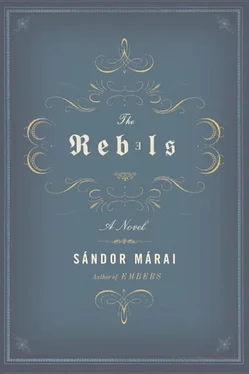You slept for a long time, his aunt was telling him. I wanted to wait until you woke up. I noticed you had been drinking spirits, sweetheart. Beware of hard drink, it can be harmful at your age. I’m just an old woman, Ábel, and can only beg you to look after yourself. You are launched on life now, my child. Do be careful what you do at night. Boys are so impulsive at this age. When is the party to be? It doesn’t matter how late you come home: look in on me. The cost of starch is up again. Eggs too. Should your father come home he should bring some provisions with him. We’ll write him a letter tomorrow and tell him you have passed your exams. Give me a kiss.
She tipped her head towards the boy’s face and squeezed it. They remained like that a moment. People live together but there are long periods when they know nothing of each other’s lives. Then one has the sensation that the other has vanished off the map. This was one corner of the world: his aunt’s furniture inherited from his mother, the garden, his father, the fiddle playing, Jules Verne, and the walk in the cemetery with his aunt on All Souls’ Day. This world had such power that nothing external could destroy it, not even the war. Just once each year some unforeseen thing broke through a chink in it, another world. Everything changed. That which had hitherto been sweet was now bitter, that which had been sour was now like gall. The hothouse became a primeval forest. And his aunt like a corpse, or less than that.
He slammed the glazed door, the bell swung and rang, the sound swam through the air and penetrated the silent house. He looked back from the gate: his aunt stood at the glazed door, her hands linked, and stared at him.
THE WINDOWS OF THE THEATER WERE LIT. A CARwas waiting by the side door that led to the upstairs boxes. He cut across the high street and decided to call on Ernõ’s father.
The cobbler had returned home some eighteen months ago with a serious wound in his lungs and had been spitting blood ever since. He lived in a high apartment block down a narrow alleyway among fishmongers, in a cellar that was five shallow steps down from the street and served as both his workplace and his accommodation. The entrance was surrounded by painted signs that he himself had made, signs involving mysterious pictures studded with captions in a hodgepodge of biblical language, exhorting any passerby to live modestly and to come to Christ. “Young man, hold high your Shield of Faith,” proclaimed one sign. “God takes no pleasure in your great knowledge, your rank, your strength, or your declarations of religion, but if you give your heart to Jesus He will put a veil between you and your past and prepare you for the glory of the Lord,” said another. “Raise our hearts, almighty Savior, like the serpent of brass, so that those who are disappointed in life might be cured by embracing You,” said a third. And one in particularly large letters declared: “Neither will death always begin with dying. There are many among us living yet coffined. Dedicate yourself to death; lay your life in the hands of Jesus and you will no longer fear death.”
People stopped, read the texts, shook their heads, and walked on in astonishment.
The workshop was densely shrouded in the half-light and a simmering bowl full of paste filled the room with its ripe, sour, acid smell. The cobbler was sitting hunched by an oxyacetylene lamp next to a low table, like a huge shaggy insect hypnotized by the circle of light. Once he noticed the boy he carefully arranged everything he had been working with on the table, including the large uncured leather sole that had been lying on his lap, the shoe knife, the thread, and a scrawny yellow half shoe, and only then stood up and bowed deeply.
“Blessed be the name of the Lord. He who confirms us in our faith and leads us to victory over our foes.”
What Ábel liked about him was that he issued his grandly ceremonial greetings in such an indifferent, commonplace manner he might have simply been mouthing “your servant.” The cobbler was a short, shriveled man entirely consumed by his disease. The weight of his leather apron seemed to drag him down. One leg was shorter than another, a condition he contracted before the bullet found his lung. A long mustache dripped from his wasted, bony face, adhering to his tousled beard and uncut hair that would not lie flat, but covered his skull like a wire wig, a shrub full of thistles. His great black eyes shone and turned with a confused light deep beneath his brow, the whites as large as a Negro’s.
“The young gentleman is looking for my son, Ernõ,” said the cobbler, his peculiarly small white sickly hand gesturing him to take a seat. There was considerable natural grace in his movements. He himself did not sit down, but leaned on a short crooked stick to address his guest. “My son Ernõ is not at home. We must be reasonable about such things. We cannot ask him to spend all his time with his parents. The young gentlemen have taken their exams today and have therefore moved up a step in the eyes of God and man.”
He spoke in a flat voice, with as little emotion or expression as ever, as if he were praying or reciting the liturgy.
“My unworthy son, Ernõ, has today been allotted his place among the gentlemen sons of gentlemen fathers,” he continued. “Judging by the available evidence it seems it was not the Lord’s will that my son Ernõ should be a prop to his parents in their old age. He wants my son to live among gentlemen, and to become my enemy. It would be foolish and absurd of me to rail against God’s will. Today my son has entered the superior rank of gentlefolk, and he must needs be the enemy of his lowly parents, his relations, and everyone who knew him.”
He made a gesture in the air with his hand as if bestowing a blessing. “He who recognizes the hand of God in mortal affairs rejoices in sickness, misfortune, and enmity between his kinfolk. My son Ernõ is a quiet boy who rejects the forthrightness the great source of Light has bestowed on me, his father, so that I may fulfill my obligations. The way has opened unto him: mountains have collapsed. It is utterly certain that the hour has come when the ruling social order must demand bloody sacrifices. Millions are lying dead in the ditches of the world and, insignificant as I am, I have been allowed to survive while the ruling classes offer involuntary sacrifices unto the earth and its waters.”
Yes, Mr. Zakarka, said Ábel. May I speak to Ernõ?
“Indeed,” he continued undisturbed. “Be so gracious as to consider the scale of the matter. We have been used to seeing how the ruling class, with its remarkable refinement, its extraordinary achievements in each and every field, remained immune to all natural disasters such as earthquakes, flood, fire, and war, providing God’s finger had not picked them out specifically. We have been used to there being two classes in the world, one living in close proximity to the other, but having less to do with it than do locusts with bears. Please be so gracious as to remember that the last days are here. The sons of the ruling class are lying in the same lime pits as the sons of the low. The prophets have risen and their words are becoming audible; the Lord has marked even my humble words out for hearing and for following.”
The cobbler threw a long shadow in the hissing light of the oxyacetylene lamp. He gave an occasional cough adding “Beg your pardon” each time as he trundled off into a corner of the workshop where he spent some time hawking and spitting.
Ábel sat there, leaning forward. He knew he had to wait until the cobbler had had his say. The Bible lay on a shelf on the wall among a few old mugs and pots, with a child-sized meter-high crucifix on the wall beside it. The cobbler swayed as he walked, very much dependent on his stick. After he had finished coughing he continued in a cracked voice.
Читать дальше












